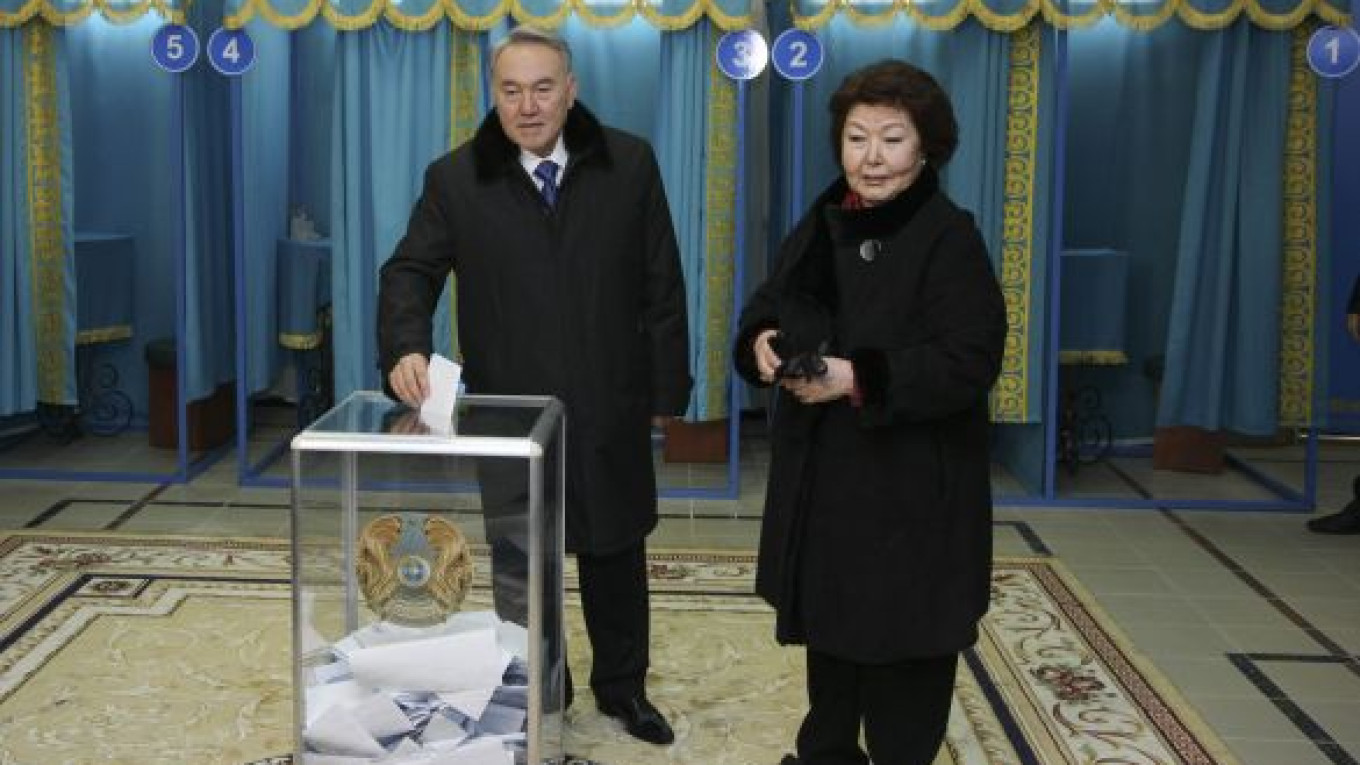ASTANA, Kazakhstan — Kazakh President Nursultan Nazarbayev appeared set to win another five years Sunday in a snap election devoid of any challenge to his two decades in power.
The echo of popular revolutions in the Arab world is almost inaudible in Kazakhstan, where Nazarbayev is popular for making stability his main motto. He even secured the vote of a rival candidate.
"Together we will vote for stability in our society, for friendship in our multi-ethnic nation, for our future and for the future of our children," Nazarbayev said after casting his vote in the national library in the showpiece capital, Astana.
"Today's vote of our citizens will stress our unity and our aspiration to implement everything that was mapped out in my state-of-the-nation address," he said, making clear that he wanted to oversee an industrialization drive over the next decade to 2020.
Kazakhstan has never held an election judged free or fair by international monitors. Nazarbayev, 70, called Sunday's vote almost two years before his term had been due to end, rejecting a plan for a referendum to extend his reign unchallenged until 2020.
The opposition, blind-sided by the early vote, has denounced the election as "the Nazarbayev show" and called for a boycott. With nationwide turnout reported at 66.4 percent by 2 p.m., there appeared to be little support for their protest.
Environmentalist Mels Yeleusizov, one of three candidates nominally standing against the president, voted for Nazarbayev.
"He is the winner. It was kind of a sports event," he said after voting in Almaty. "He has won, and I shake his hand."
In the previous election in 2005, Nazarbayev was re-elected with a 91.15 percent majority. Voter turnout was 76.78 percent.
First official results were expected early on Monday.
The Organization for Security and Cooperation in Europe, chaired last year by Kazakhstan, has stationed more than 300 observers around the country. Its election monitors issued a critical interim report ahead of the vote.
Janez Lenarcic, director of the OSCE's Office for Democratic Institutions and Human Rights, said restrictions on the media and on freedom of expression were among the shortcomings.
"Efforts are being made by the authorities to make further progress in the area of democratic reforms, which currently seem to be lagging somewhat behind the achievements of Kazakhstan in economic and social development," Lenarcic told reporters.
Nazarbayev's expected re-election does nothing to answer the question cited by many investors as the biggest political risk in Kazakhstan: Who will eventually succeed Nazarbayev?
The president, who has built warm ties with giant neighbors Russia and China, has said he will rule for as long as his health and his people will allow. Some analysts say he could use his next five years in office to groom a pliant successor.
"We don't yet have confidence in any other person," said pensioner Fidaya Sabirova, 70, after voting in Astana. "Where there are wars all around, we have calm."
Alau Murzhusupov, a 30-year-old father of two in the capital, echoed her: "A strong leader means a strong country."
The first 10 voters to arrive at each polling station received food blenders, computer memory cards and other gifts, said an official at a polling station in Astana.
Layla Adilova, a 37-year-old school principal in Almaty, said she voted for Nazarbayev. People in her profession were earning up to $480 a month, she said, and were awaiting a 30 percent pay raise in the summer.
A Message from The Moscow Times:
Dear readers,
We are facing unprecedented challenges. Russia's Prosecutor General's Office has designated The Moscow Times as an "undesirable" organization, criminalizing our work and putting our staff at risk of prosecution. This follows our earlier unjust labeling as a "foreign agent."
These actions are direct attempts to silence independent journalism in Russia. The authorities claim our work "discredits the decisions of the Russian leadership." We see things differently: we strive to provide accurate, unbiased reporting on Russia.
We, the journalists of The Moscow Times, refuse to be silenced. But to continue our work, we need your help.
Your support, no matter how small, makes a world of difference. If you can, please support us monthly starting from just $2. It's quick to set up, and every contribution makes a significant impact.
By supporting The Moscow Times, you're defending open, independent journalism in the face of repression. Thank you for standing with us.
Remind me later.


